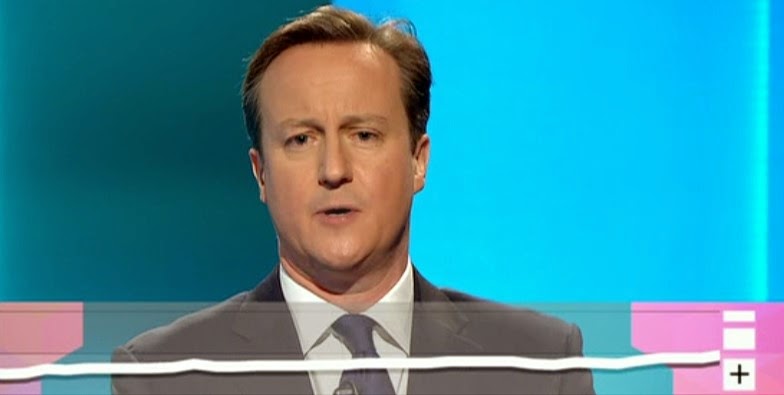This is now the first Conservative majority government the UK has had for a very long time. Over the past 50 years, the UK has become the fiefdom* of subversive factions that have just one thing in common: they are all minorities. Despite polling a minority of English votes, Labour even "won" the majority of English seats in 2005 by gerrymandering on a massive scale, and has damaged British society and its way of life for ever. Can Dave now fix it?
Monday, April 06, 2015
Friday, April 03, 2015
Weary already?
This election marathon is going to test the stamina of everyone in the country.The election debates before "selected" audiences have done little but keep the media excited and confused. So here is all you need to know...
 |
| Nigel Farage - the most direct |
 |
| Dave looking Prime Ministerial |
 |
| Scary Scottish Dominatrix and Big Spender of English Cash |
 |
| The Biggest Loser: Ed "Talks in Slogans" Millband |
 |
| Australian Woman Who Wants to Spend Your Money |
 |
| Hi de Hi! hwyl fawr a phob lwc |
 |
| "Just like that" - an excellent audience participation moment |
 |
| Pritti by name: clear winner of the Political Totty Challenge |
 |
| Brave face: half of Labour's pair of Balls |
Thursday, March 12, 2015
Future of the BBC: An opportunity not to be missed
The BBC review held by the DCMS House of Commons committee published its report.
No politicians dare tell the BBC where to get off, for the obvious reason that they have carelessly allowed the BBC to gain huge influence (if not control) of the UK's cultural (and political) agenda over the past 20 years.

We appreciate a lot of worthy work went into this document (and not a few "field trips" to gather facts in war zones like Denmark) but it is at least 3x longer than it needs to be. If we have to be charitable and avoid the temptation to summarise the future of an anachronism like the BBC in a single page, then we would start with the conclusions as an executive summary and let the readers delve in for the detail. We lost the will to live around page 70... but forced ourselves...
But this is a document focused on the care and feeding of a dinosaur that is facing a slow but certain extinction at the hands of a (fascist) liberal elite that knows better than the paying customers what the paying customers want to watch and hear.
The report dutifully repeats the deferential self interest of its various "witnesses". Mandy Rice Davies would have had a field day. Excursions down memory lane are inevitable in a report on a once-indispensable national institution that has been overtaken by evolution, and has been run aground by evidently the wrong people pursuing their own personal political agendas. Would the public rather have "Jeremy the nemesis of PC Clarkson" in charge - or a well meaning but aged opera buff, Lord Hall?
The fact that the "save Jezza" vote is running at well more than 100:1 ahead of the prissy "Sack Jezza" North London media mafia and opera-loving numpties, seems to make the point rather well.
There is nowhere near enough rationalisation proposed in the report; it is another fudge, when in this period, the technology will completely outpace any decisions made at the next review, unless those doing it are VASTLY more radical than a bunch of the usual luvvies exhumed from the fossils of the Great & Good can ever envisage.
Most depressing of all is that amongst endless concern expressed for the support of the "creative industries" is that there is no reference to the priceless and shameless patronage afforded by the BBC to Twitter, Facebook, Apple, Google, Microsoft (especially Skype) etc etc.
Although that said, it is arguable that YouTube provides the crucial clues to the future reality, since that contains all the grass roots content addressing every conceivable minority interest in politics, religion, society, sport and education that the BBC with £50bn pa could not possibly create and distribute.
So maybe one answer is for a New BBC (NBBC) to provide a grown-up framework of regulation, review and recommendations for a UK devised (and owned) version of YouTube (let's call it timefree.tv for the purpose of argument) which of course allows viewers to contribute, vote and comment on absolutely everything. Just as the theatre critics used to be the real arbiters of entertainment back at the turn of the last century, so it will be again as trusted critics acquire genre followings.
Jeremy Clarkson's anointed choice of viewing will be golden for advertisers. David Beckham's sports night will have a global following and advertiser base. It will tell his faithful following what passionate blokes want to watch. Danny Cohen's coterie will hang on his personal viewing choices, and no advertisers will be in the least interested.
All the savings from the ending of BBC ice age should be spent on improving universal broadband access in the UK, and getting the grisly cartel of brutish mobile service providers back in line.
And finally, please pop along and sign this magnificent petition: this is a not a vote on the vague facts of punch up case; this is a much more fundamental point that the BBC's medialand executives cost too much and listen too little.
No politicians dare tell the BBC where to get off, for the obvious reason that they have carelessly allowed the BBC to gain huge influence (if not control) of the UK's cultural (and political) agenda over the past 20 years.

We appreciate a lot of worthy work went into this document (and not a few "field trips" to gather facts in war zones like Denmark) but it is at least 3x longer than it needs to be. If we have to be charitable and avoid the temptation to summarise the future of an anachronism like the BBC in a single page, then we would start with the conclusions as an executive summary and let the readers delve in for the detail. We lost the will to live around page 70... but forced ourselves...
But this is a document focused on the care and feeding of a dinosaur that is facing a slow but certain extinction at the hands of a (fascist) liberal elite that knows better than the paying customers what the paying customers want to watch and hear.
The report dutifully repeats the deferential self interest of its various "witnesses". Mandy Rice Davies would have had a field day. Excursions down memory lane are inevitable in a report on a once-indispensable national institution that has been overtaken by evolution, and has been run aground by evidently the wrong people pursuing their own personal political agendas. Would the public rather have "Jeremy the nemesis of PC Clarkson" in charge - or a well meaning but aged opera buff, Lord Hall?
The fact that the "save Jezza" vote is running at well more than 100:1 ahead of the prissy "Sack Jezza" North London media mafia and opera-loving numpties, seems to make the point rather well.
There is nowhere near enough rationalisation proposed in the report; it is another fudge, when in this period, the technology will completely outpace any decisions made at the next review, unless those doing it are VASTLY more radical than a bunch of the usual luvvies exhumed from the fossils of the Great & Good can ever envisage.
Most depressing of all is that amongst endless concern expressed for the support of the "creative industries" is that there is no reference to the priceless and shameless patronage afforded by the BBC to Twitter, Facebook, Apple, Google, Microsoft (especially Skype) etc etc.
Although that said, it is arguable that YouTube provides the crucial clues to the future reality, since that contains all the grass roots content addressing every conceivable minority interest in politics, religion, society, sport and education that the BBC with £50bn pa could not possibly create and distribute.
So maybe one answer is for a New BBC (NBBC) to provide a grown-up framework of regulation, review and recommendations for a UK devised (and owned) version of YouTube (let's call it timefree.tv for the purpose of argument) which of course allows viewers to contribute, vote and comment on absolutely everything. Just as the theatre critics used to be the real arbiters of entertainment back at the turn of the last century, so it will be again as trusted critics acquire genre followings.
Jeremy Clarkson's anointed choice of viewing will be golden for advertisers. David Beckham's sports night will have a global following and advertiser base. It will tell his faithful following what passionate blokes want to watch. Danny Cohen's coterie will hang on his personal viewing choices, and no advertisers will be in the least interested.
 |
| John Whittingdale, DCMS Committee Chairman |
Another opportunity that the report might have addressed was the growing contradictions of 18th century copyright in a
globalised world of 21st century content. The BBC with a vast amount content
under its copyright control enjoys a unique opportunity to try and lead with
ideas about reform in this vexed area - before the US lobby manages to extend
copyright shackles on its interests beyond the Second Coming. The idea that
Snow White and the Seven Dwarfs should still be coining it in for Disney after
getting on for a century is interesting; but is it conducive to new creative
activity?
This "winner take all" effect of copyright does not do a lot to develop the broader creative industry.
This "winner take all" effect of copyright does not do a lot to develop the broader creative industry.
How about 50% of all royalties
collected on works over 25 years old - especially where the original creator no
longer exists as a person or corporately - should be paid to a creative
innovation fund to be administered like the lottery "good causes
fund" ? Morally, those works only remain valuable thanks to unanticipated
innovations in storage and delivery which amount to "accidents of
birth", so some of that windfall income should also go towards improving
universal broadband access - along with all the other savings that can made
from the ending of the BBC's creative ice age ..?
The recent Marvin Gaye Blurred Lines music copyright case will only unleash hordes of legal trolls with software that compares sound tracks and looks for similarities. I imagine Shazzam and its sound fingerprint technology is in a perfect position to make the lives of many musicians who may have "paid inadvertent homage" very difficult.
The recent Marvin Gaye Blurred Lines music copyright case will only unleash hordes of legal trolls with software that compares sound tracks and looks for similarities. I imagine Shazzam and its sound fingerprint technology is in a perfect position to make the lives of many musicians who may have "paid inadvertent homage" very difficult.
All the savings from the ending of BBC ice age should be spent on improving universal broadband access in the UK, and getting the grisly cartel of brutish mobile service providers back in line.
And finally, please pop along and sign this magnificent petition: this is a not a vote on the vague facts of punch up case; this is a much more fundamental point that the BBC's medialand executives cost too much and listen too little.
Subscribe to:
Comments (Atom)






